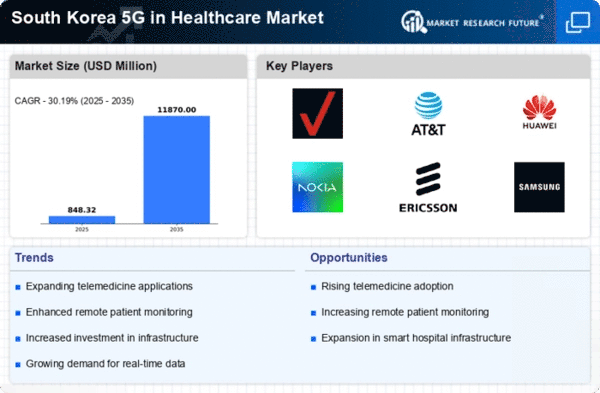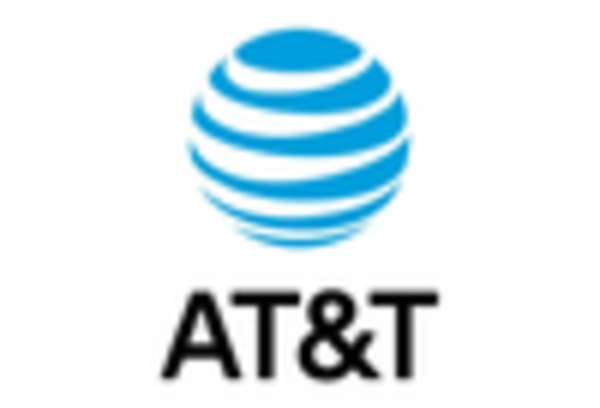Growing Demand for Telehealth Services
The increasing demand for telehealth services significantly propels the 5g in-healthcare market in South Korea. As patients seek more convenient healthcare options, telehealth has emerged as a viable solution, allowing for remote consultations and follow-ups. The South Korean government has recognized this trend, implementing policies to support telehealth initiatives. It is estimated that the telehealth market in South Korea could reach $2 billion by 2025, driven by the adoption of 5G technology. This growth is likely to enhance patient access to healthcare services, particularly in rural areas where medical facilities may be limited. The integration of 5G technology into telehealth services is expected to improve the quality of care, reduce wait times, and increase patient satisfaction.
Integration of IoT Devices in Healthcare
The integration of Internet of Things (IoT) devices in healthcare is a prominent driver of the 5g in-healthcare market in South Korea. IoT devices, such as wearable health monitors and smart medical equipment, require high-speed connectivity to function effectively. 5G technology provides the necessary bandwidth and low latency to support a vast network of connected devices. The South Korean government has been actively promoting the adoption of IoT in healthcare, with initiatives aimed at creating smart hospitals. It is projected that the IoT healthcare market in South Korea will reach $1.2 billion by 2026, largely fueled by the capabilities of 5G technology. This integration is expected to enhance patient monitoring, data collection, and overall healthcare delivery.
Regulatory Support for 5G Implementation
Regulatory support for 5G implementation plays a vital role in driving the 5g in-healthcare market in South Korea. The government has established a favorable regulatory framework to facilitate the deployment of 5G networks, particularly in the healthcare sector. This includes initiatives aimed at reducing barriers to entry for healthcare providers and technology companies. The South Korean Ministry of Health and Welfare has outlined plans to integrate 5G technology into public health services, which is expected to enhance service delivery and patient care. As a result, investments in 5G infrastructure are projected to increase, with estimates suggesting that the healthcare sector could see a growth of 30% in 5G-related investments by 2027. This regulatory environment is likely to foster innovation and accelerate the adoption of 5G solutions in healthcare.
Advancements in Medical Imaging Technologies
Advancements in medical imaging technologies are a crucial driver for the 5g in-healthcare market in South Korea. The ability to transmit high-resolution images quickly and efficiently is vital for accurate diagnostics and treatment planning. 5G technology enables the transfer of large imaging files, such as MRI and CT scans, in real-time, which is essential for timely decision-making in critical care situations. The South Korean healthcare sector is anticipated to allocate around $800 million towards upgrading imaging technologies by 2025, with a significant portion directed towards 5G-enabled solutions. This investment is likely to enhance the capabilities of healthcare providers, allowing for more precise diagnostics and improved patient outcomes.
Enhanced Connectivity for Medical Facilities
The 5g in-healthcare market in South Korea is driven by the need for enhanced connectivity within medical facilities. With the increasing complexity of healthcare services, hospitals and clinics require robust and reliable communication networks. 5G technology offers ultra-low latency and high-speed data transfer, which is essential for real-time applications such as remote surgeries and telemedicine. According to recent data, the healthcare sector in South Korea is projected to invest approximately $1.5 billion in 5G infrastructure by 2026. This investment is likely to facilitate seamless communication between healthcare providers and patients, thereby improving overall service delivery. Enhanced connectivity not only supports the operational efficiency of healthcare facilities but also enhances patient outcomes by enabling timely interventions and consultations.
















